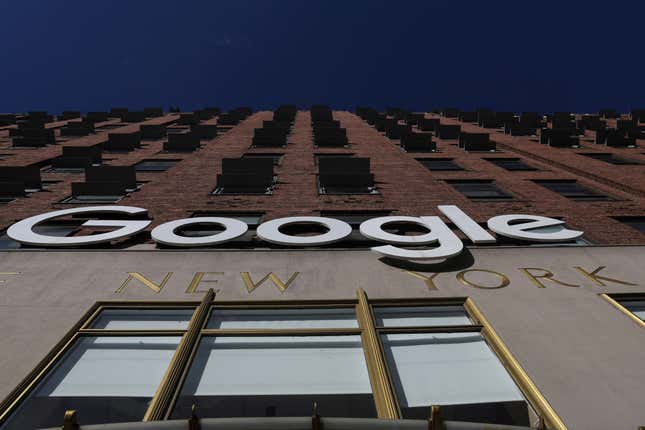
Google is making money from those misleading abortion seekers, according to a new study.
Fake abortion clinics have spent a combined $10.2 million on Google search ads over the last two years, a new report from the Center for Countering Digital Hate (CCDH) revealed, citing data from enterprise analytics tool Semrush.
The search giant show results for “fake reproductive health clinics—sometimes called Crisis Pregnancy Centers—appear to offer independent advice on reproductive healthcare but are actually run by ideological anti-choice organizations who try to shame those seeking abortions and employ scare tactics based on medical misinformation,” CCDH wrote in its findings released today (June 15).
Deceptive Google ads by the anti-choice movement, by the digits
188: Crisis pregnancy centers that placed ads on Google worth an estimated total of more than $10 million over two years
2,600: The estimated number of so-called Crisis Pregnancy Centers operating across the country, outnumbering genuine clinics by a factor of three to one
4 times: How much more the anti-choice movement spent on Google Search ads for fake clinics than it did on ads for overt campaigns to restrict abortion care
2 times: How much more fake clinics spent in states where abortion is legal compared to states with bans. The top three states for fake clinic ad spend were Pennsylvania, North Carolina and California—everywhere abortion is currently legal
71%: Share of fake clinic websites advertised on Google Search that use deceptive techniques to target people seeking reproductive care
16%: Share of fake clinic websites that promoted misleading claims about abortion, including “exaggerating the risks to mental health, overstating the risk of complications to future pregnancies such as fertility loss, or claiming that abortion can increase the risk of breast cancer,” according to the CCDH
38%: Share of fake clinic websites that don’t carry homepage disclaimers clearly stating that they do not provide abortions
40%: Share of fake clinics that promote so-called abortion pill “reversal” (APR) to undo a medication abortion after the first of two pills. It’s unproven and likely unsafe
$2.6 million: How much Google made from ads leading to fake clinic websites promoting APR since promising not to run ads for the procedure in September 2021
15,000: Number of different queries related to abortion, including “abortion clinic near me”, “abortion pill”, “abortion clinic”, and “planned parenthood,” that fake clinics target with these ads
102 million: Searches for queries related to abortions made by Americans each year
Quotable: Google is enabling the anti-choice movement
“Google is selling the digital equivalent of Super Bowl slots to deceptive anti-choice bidders, allowing them to distort reality and limit the choices available to those searching for information and options.” —CCDH CEO Imran Ahmed
Company of interest: Google
Google is the go-to search engine for the vast majority of internet users. US-based internet users tend to bestow the most faith in the Alphabet-owned platform versus other sites like Facebook and TikTok. But people aren’t great at telling the difference between an ad and an organic search result—68% of users can’t tell distinguish between the two.
That’s why it’s a problem that Google has been aware of these bad actors for at least a couple of years, but is doing little to stop them.
A year after a September 2021 report by the CCDH, Google didn’t keep its promise of labelling these fake abortion clinics clearly. A June 2022 report by the group revealed that in states where anti-abortion laws were “triggered” after Roe v Wade was overturned, one in ten results led to fake clinic websites.
In fact, the spread of misinformation has gotten worse—more discriminatory, even. And CCDH is not the only one ringing alarm bells. In abortion care search results, Google was likelier to target low-income women versus their wealthier counterparts in ads promoting anti-abortion crisis pregnancy centers, according to research from the Tech Transparency Project published in February.
Rabbit hole: Cottage industry of anti-choice digital marketing companies
Google has “enabled a cottage industry of anti-choice marketing firms,” the CCDH alleges in its report. Marketing agencies like Choose Life Marketing, RankMonsters, and iRapture, targeting abortion seekers are not only allowed to advertise, but sometimes, their campaigns are even subsidized.
Back in 2019, Google was criticized for giving a group of anti-choice clinics run by a Catholic group tens of thousands of dollars worth of free advertising. The company has since changed its policies to require such organizations to note whether they actually offer abortion services. But the grants are still falling in the wrong hands: At least one anti-choice marketing firm mentioned in the report helps fake clinics access the behemoth’s Ad Grant scheme, which offers non-profit organizations up to $10,000 per month in free ad credits.
How Google can fight misinformation from fake abortion clinics, as per CCDH
🔍 Demand transparency from fake clinics running ads, including banners specifying they don’t provide abortions
💰 End ad grants for deceptive fake clinic websites
🫴 Highlight and prioritize genuine abortion clinics in search results
Related stories
🇲🇽 How Mexico ensures access to safe abortion without legalizing it
🇮🇳 India’s supreme court has expanded abortion rights to all women
🏥 Rheumatology patients are already having trouble accessing essential drugs because of abortion bans